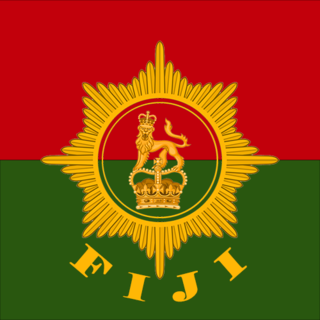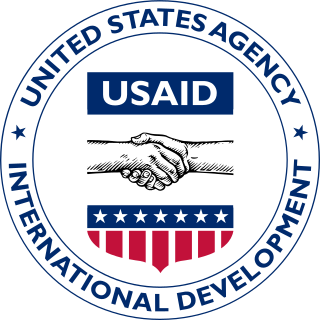Related Research Articles

The Republic of Fiji Military Forces is the military force of the Pacific island nation of Fiji. With a total manpower of about 6,500 active soldiers and approximately 6,200 reservists, it is one of the smallest militaries in the world and the third largest in the South Pacific region. The Ground Force is organised into six infantry and one engineer battalions.

The United States Agency for International Development (USAID) is an independent agency of the United States government that is primarily responsible for administering civilian foreign aid and development assistance. With a budget of over $50 billion, USAID is one of the largest official aid agencies in the world and accounts for more than half of all U.S. foreign assistance—the highest in the world in absolute dollar terms.

Tertiary education fees in Australia are payable for courses at tertiary education institutions. Responsibility for fees in vocational education and training (VET) rests primarily with the state and territory governments, while fees policy in higher education is largely controlled by the Commonwealth Government.

In the United States, the Supplemental Nutrition Assistance Program (SNAP), formerly known as the Food Stamp Program, is a federal government program that provides food-purchasing assistance for low- and no-income people to help them maintain adequate nutrition and health. It is a federal aid program administered by the U.S. Department of Agriculture (USDA) under the Food and Nutrition Service (FNS), though benefits are distributed by specific departments of U.S. states.

The University of the South Pacific (USP) is a public research university with locations spread throughout a dozen countries in Oceania. Established in 1968, the university is organised as an intergovernmental organisation and is owned by the governments of 12 Pacific island countries: the Cook Islands, Fiji, Kiribati, Marshall Islands, Nauru, Niue, Samoa, Solomon Islands, Tokelau, Tonga, Tuvalu and Vanuatu.

The Ministry of Children, Community and Social Services is the ministry in Ontario, Canada responsible for services to children and youth, social services such as welfare, the Ontario Disability Support Program, and community service programs to address homelessness, domestic violence, spousal support, adoption, and assisted housing for people with disabilities. Michael Parsa was appointed Minister of Children, Community and Social Services after the resignation of Merrilee Fullerton in 2023.
A Pell Grant is a subsidy the U.S. federal government provides for students who need it to pay for college. Federal Pell Grants are limited to students with exceptional financial need, who have not earned their first bachelor's degree, or who are enrolled in certain post-baccalaureate programs, through participating institutions. Originally known as a Basic Educational Opportunity Grant, it was renamed in 1980 in honor of Democratic U.S. Senator Claiborne Pell of Rhode Island. A Pell Grant is generally considered the foundation of a student's financial aid package, to which other forms of aid are added. The Federal Pell Grant program is administered by the United States Department of Education, which determines the student's financial need and through it, the student's Pell eligibility. The U.S. Department of Education uses a standard formula to evaluate financial information reported on the Free Application for Federal Student Aid (FAFSA) for determining the student's Expected Family Contribution (EFC).
The Fiji Mission to the European Union is responsible for Fiji's diplomatic relations with the European Union and with all member countries, except those with which Fiji maintains specific diplomatic relations, such as the United Kingdom.
The Low Income Home Energy Assistance Program is a United States federal social services program first established in 1981 and funded annually through Congressional appropriations. The mission of LIHEAP is to assist low income households, particularly those with the lowest incomes that pay a high proportion of household income for home energy, primarily in meeting their immediate home energy needs. The program, part of the United States Department of Health and Human Services (HHS), is funded by grants appropriated from the federal government.
The California Medical Assistance Program is the California implementation of the federal Medicaid program serving low-income individuals, including families, seniors, persons with disabilities, children in foster care, pregnant women, and childless adults with incomes below 138% of federal poverty level. Benefits include ambulatory patient services, emergency services, hospitalization, maternity and newborn care, mental health and substance use disorder treatment, dental (Denti-Cal), vision, and long-term care and support. Medi-Cal was created in 1965 by the California Medical Assistance Program a few months after the national legislation was passed. Approximately 15.28 million people were enrolled in Medi-Cal as of September 2022, or about 40% of California's population; in most counties, more than half of eligible residents were enrolled as of 2020.
Federal Student Aid (FSA), an office of the U.S. Department of Education, is the largest provider of student financial aid in the United States. Federal Student Aid provides student financial assistance in the form of grants, loans, and work-study funds. FSA is a Performance-Based Organization, and was the first PBO to be established in the US government.
The Ministry of Social Development is the public service department of New Zealand charged with advising the New Zealand Government on social policy, and providing social services. MSD is the largest public service department, employing public servants in over 200 locations around New Zealand. MSD delivers its programmes and services through a number of business groups and agencies.
Social security, in Australia, refers to a system of social welfare payments provided by Australian Government to eligible Australian citizens, permanent residents, and limited international visitors. These payments are almost always administered by Centrelink, a program of Services Australia. In Australia, most payments are means tested.
The Illinois Department of Healthcare and Family Services (HFS), formerly the Department of Public Aid, is the code department of the Illinois state government that is responsible for providing healthcare coverage for adults and children who qualify for Medicaid, and for providing child support services to help ensure that Illinois children receive financial support from both parents.
Bright from the Start, also known as Georgia Department of Early Care and Learning, was established on July 1, 2004. The main office is located in downtown Atlanta, Georgia. The department licenses and monitors daycare centers and all state funded pre-k. Bright from the Start is headed by one commissioner and by a board of administrators. Bright from the Start provides children with quality preschool knowledge that will be necessary for their future school achievements. They want to offer a system of professional development for the providers and for the staff.
The Missouri Department of Social Services (DSS) is a state agency of Missouri. It has its headquarters in the Broadway State Office Building in Jefferson City. The department operates the state's social services.
The Human Resources Administration or Department of Social Services (HRA/DSS) is the department of the government of New York City in charge of the majority of the city's social services programs. HRA helps New Yorkers in need through a variety of services that promote employment and personal responsibility while providing temporary assistance and work supports. Its regulations are compiled in title 68 of the New York City Rules. The current Commissioner of HRA is Molly Wasow Park, who was appointed to the position by Mayor Eric Adams. HRA is the largest city social services agency in the United States. It has a budget of $9.7 billion, employs over 14,000 people, and serves over 3 million New Yorkers.

Dr. Ifereimi Waqainabete is a Fijian politician and Member of the Parliament of Fiji who served as Minister for Health and Medical Services in the FijiFirst government from 2018 to 2022. Before entering politics Dr Waqainabete was a general surgeon in Fiji and Associate Professor of General Surgery at Fiji National University, former President of the Fiji Medical Association, President of the Pacific Island Surgeons Association, and former Chairman of Fiji Medicinal Board. He was on leave from his academic and surgical duties to partake in the 2018 elections as a candidate for the Fiji First Party.

The COVID-19 pandemic in Fiji is part of the ongoing worldwide pandemic of coronavirus disease 2019 caused by severe acute respiratory syndrome coronavirus 2. The first case of the disease in Fiji was reported on 19 March 2020 in Lautoka. as of 3 January 2022, the country has had a total of 55,009 cases as of which 2,417 are currently active and 702 deaths, with cases reported on all divisions of the country. Apart from the COVID-19 deaths, 621 COVID-19 positive patients have died from pre-existing non-COVID-19 related illnesses. In March 2021, Fiji became the first Pacific island country to receive COVID-19 vaccines through the COVAX initiative with frontline workers and first responders the first to be vaccinated. As of 2 January 2022, more than 600,000 (98%) Fijians have received their first jab of the vaccine and almost 560,000 (92%) Fijians have received their second jab and are fully vaccinated. To date, only the AstraZeneca vaccine, Moderna vaccine and the Pfizer BioNTech vaccine have been deployed in the country. The country have also administered booster shots. Vaccination is mandated, however only to the adult population.
The COVID-19 vaccination campaign began in Fiji on the first quarter of 2021 and will continue throughout the year with the goal of vaccinating all eligible Fijians. The government has made it mandatory for all eligible adults to take the COVID-19 vaccines.
References
- ↑ Sainiani Boila (28 September 2023). "26,000 children assisted by FENC Fiji". FBC News. Retrieved 5 August 2024.
- ↑ Peceli Naviticoko (26 August 2023). "FENC Fiji extends its focus to include disadvantaged families". FBC News. Retrieved 5 August 2024.
- ↑ Swashna Chand (14 January 2009). "3000 Students Get Help From FENC". Fiji Sun. Retrieved 5 August 2024.
- ↑ Apenisa Waqairadovu (3 November 2023). "Over 5,000 applicants seek help from FENC Fiji". FBC News. Retrieved 5 August 2024.
- ↑ "School packs for 11,000 students". Fiji Times. 10 January 2024. Retrieved 5 August 2024.
- ↑ "FENC: Students laid back". Fiji Times. 24 January 2022. Retrieved 5 August 2024.